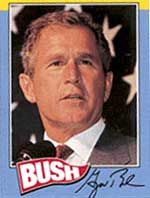Portions of the following essay were adapted from the new book Earth Rising: American Environmentalism in the 21st Century.
“Politics,” said Will Rogers, “has got so expensive that it takes lots of money to even get beat with.” And that was in the 1930s.

The green stuff.
Politics today is a lot more expensive. In the 1997-1998 fiscal year, which included an off-year national election, political action committees shelled out $230 million. Of that amount, nearly $150 million came from business organizations and $392,000 came from environmental organizations. And that is only the tip of the iceberg because it does not include “soft” money contributions. In the two years leading up to the 2000 election, it is estimated that candidates for office will spend some $3 billion, much of it on “uninformative” television advertisements. Nor does that sum include the more than $1.25 billion spent on lobbying Congress and the executive branch by the “influence industry” — corporations, industry trade associations, and other interest groups. John Stauber, editor of PR Watch, contended that “the corporate flacks, hacks, lobbyists, and influence peddlers, the practitioners of modern PR … have become a kind of occupation army in our democracy.”
“To politicians, money is the milk of politics,” explained Doug Bailey, a veteran Republican political consultant who publishes the daily Hotline report. “It is what drives political campaigns. It is a ridiculous situation, but it is true. Lobbyists give to incumbents as a way of saying ‘Thank you, and we know you will be with us next year.’ And if the incumbent loses, they immediately give to the winner to retire his or her campaign debt.” Indeed, many, if not most, politicians spend a substantial amount of their time in office raising money for the next reelection campaign. The League of Conservation Voters (LCV) has had some success in electing pro-environmental candidates and defeating anti-environmental candidates, but as LCV President Deb Callahan noted, the league has the financial resources to intervene in only a limited number of races. “It breaks your heart,” she said. “Money makes an absolute difference in electoral politics.” Community activist Terri Swearingen, who was deeply disillusioned when construction of a waste incinerator in East Liverpool, Ohio, went forward after Al Gore had promised to block it during his 1992 vice presidential campaign, said that in our political system, “money can make dioxin safe on corn flakes.”
Up Against the Wallet
The environmental movement will never be able to come remotely close to matching the corporations and their auxiliaries dollar for dollar in influencing the electoral and policy-making processes. The national environmental organizations now devote only 1 percent of their budgets to politics, and those budgets are dwarfed by the financial resources available to the foes of environmental regulation. Because the system is so stacked against it, the environmental movement will not be a major factor in the electoral process unless and until the system is changed. Accordingly, campaign finance reform ought to be at the very top of the environmental movement’s legislative agenda.

Earth Rising: American
Environmentalism in the 21st
Century
By Philip Shabecoff
Island Press, 240 pages, 2000
“It is absolutely crucial to fight for campaign finance reform,” insisted California legislator Tom Hayden. “Nothing could be more important than breaking the connection between money and politics.” Many leading national environmental organizations agree with that statement, but few of them are putting forth much effort to change the law. One exception is the U.S. Public Interest Research Group (U.S. PIRG), whose executive director, Gene Karpinski, said, “We put campaign finance reform at the top of our agenda.” But U.S. PIRG has programs that extend beyond environmental policy. Arlie Schardt, who heads Environmental Media Services and has worked in political campaigns as well as in the environmental movement and journalism, believes that “campaign finance reform is the single biggest environmental issue in this country.” But when he tried to get the national environmental groups to unite behind a campaign to reform the law, “not one of the top groups was willing to do anything about it.” Why? “Inertia as much as anything,” Schardt said.
In failing to support campaign finance reform actively, however, environmentalists undermine their own prospects for any significant progress. Greg Wetstone, legislative director of the Natural Resources Defense Council and former staff director of a House environmental subcommittee, asserted: “Campaign finance reform is vital. It is impossible for us to win, especially in committees, because we can never outbid the opposition.”
Changing the campaign laws would not be a walk in the park even if the environmentalists unite with others who see the domination of politics by money as a travesty of political equality. There is, of course, a catch-22. The legislative battle needed to enact reform cannot be fought without a substantial amount of money. And those who oppose reform, today’s big political spenders, are in a far better position to buy legislation. Moreover, there is a constitutional hurdle to leap. In its 1976 decision in Buckley v. Valeo, the United States Supreme Court ruled that unlimited expenditure of money is free speech protected by the First Amendment. The decision overturned congressional legislation that limited spending on congressional campaigns. Many legal scholars have contended that a ruling that gives more free speech to the wealthy than to other Americans is a serious misreading of what the founders intended. But the decision stands.
Nevertheless, the task of reform is not impossible. By century’s end, a number of states had adopted campaign finance reform laws. And the environmentalists should not be alone in the effort. Many sectors of American society who perceive themselves to be disenfranchised by the power of money in politics or who are dismayed by the inequity of a system that gives the wealthy more rights under the Constitution than the poor are seeking to change the system.
Or Should Enviros Stick to Tree-Hugging?
William Clark of Harvard University’s John F. Kennedy School of Government contended that because campaign finance reform is “not an environmental issue per se” and because “the environmentalists would be only a tiny part of the folks working on campaign finance reform, the chances are they could do more for the environment by putting their money into saving 600 acres of forest, and so [they should] should stick to that.” In this view, environmental organizations should spend their limited financial resources only on immediate environmental problems, not on trying to change the political system. The problem with that argument, however, is that the system can dictate whether and how environmental problems are solved. Environmental groups were unable to protect many areas of national forest, for example, after the 104th Congress, dominated by foes of governmental regulation, passed the so-called salvage logging rider, which gave timber companies access to previously out-of-bounds forest areas.

Green acres?
Money works to dilute the political
influence of the environmental movement in another important way — through the tax laws. Most environmental groups rely heavily for support on tax-exempt donations. Under the current tax code, nongovernmental organizations that receive such donations are prohibited from engaging in partisan political activity. They can distribute information to help educate the electorate about issues, but the law restricts their lobbying activities and prohibits them from giving money to, or working for or against, any candidate for office. For-profit businesses have no such restrictions.
In Ecology and the Politics of Scarcity Revisited, William Ophuls and A. Stephen Boyan Jr. assert: “The gross political inequality of profit and nonprofit interests is epitomized by the favorable tax treatment accorded the former … the nonprofit organizations that depend very heavily on donations are severely handicapped; if they lobby, they undercut their financial support. Businesses, by contrast, can deduct any money spent for the same purpose from their taxable income and pass on the remaining expense in the form of higher prices. The public, both as consumers and as taxpayers, therefore subsidizes one side in environmental disputes.” As one foundation executive noted, because of the prohibitions of the tax law, “the best and brightest in the environmental movement cannot participate in politics.”
This inequity should be remedied. Although the necessary changes in the tax laws were not possible in the end-of-century political morass, the environmental community, in collaboration with other communities in the voluntary sector such as community development organizations, ought to begin preparing the ground for reform immediately. In the meantime, they need to do all they can under the current statutory limitations — for example, significantly strengthening the League of Conservation Voters.
Unfortunately, the mainstream environmental organizations have been made timid by the tax laws and treat them with fear and reverence, as if they are a sword of Damocles that may fall at any instant and sever the financial support provided by wealthy donors. Hayden, a warrior in the electoral lists for many years, said he thinks that most environmentalists just do not get it. “If government is creating the crisis, it has to be confronted politically and not just through tax-exempt organizations. There is an environmental culture that seems unable to understand what every American outcast group has learned about politics — you don’t get your way by being a lobbyist dependent on the system. You get your way by threatening the system through electoral politics.”
The Best President Money Can Buy

Al Gore, true-blue green?
The losers in the primary contest were Republican Sen. John McCain and former Democratic Sen. Bill Bradley. Both had made campaign finance reform a centerpiece of their appeal to voters. The environmental community played little role in the primary elections and was virtually silent on the campaign finance issue.
After his primary victory, Gore, who has been accused of abusing the political fundraising process, embraced campaign finance reform, saying it would be the first piece of legislation he would send to Congress after taking possession of the Oval Office. Gore had been an ardent environmental advocate while a member of the Senate and presumably would be a strong supporter of environmental initiatives if he took possession of the White House in his own right.

Dough boy.
Bush, in contrast, has continued to voice adamant opposition to any kind of real political finance reform. And why shouldn’t he? It is in his self-interest to do so. He is clearly the candidate of choice of big money, particularly of the fossil fuel, real-estate development, and other industrial and commercial lobbies that have a financial stake in opposing efforts to preserve and protect the environment. Bush could in good conscience adopt as a campaign slogan, “I’d be the best president money can buy.” Indeed, as suggested by advertisements paid for by a supporter that praised Bush’s dubious record on clean air in Texas, money can even try to put a coat of whitewash on a poor environmental record. Unlike his father, Gov. Bush has given no signal that he has any desire to be an environmental president.
The political process in this first year of the new century demonstrates afresh that campaign finance reform is a major environmental issue — perhaps the major environmental issue, given the current political climate in the United States. So far, however, the environmental community has not reached that conclusion.



